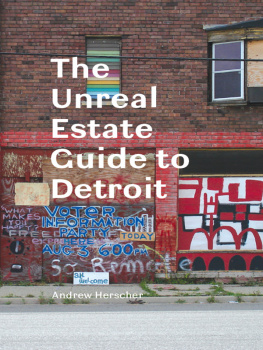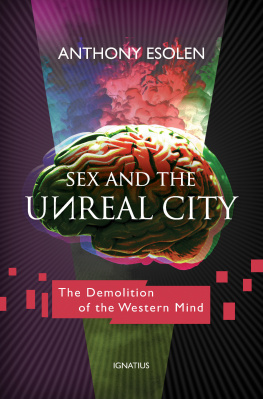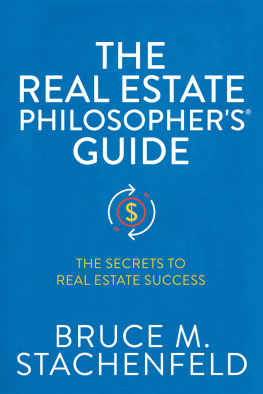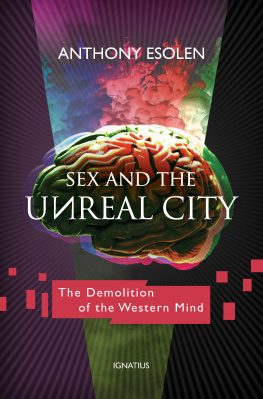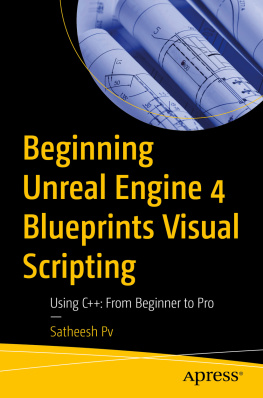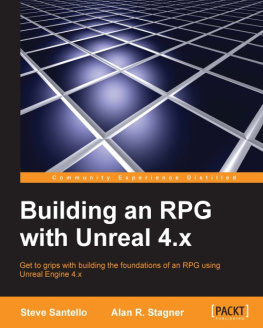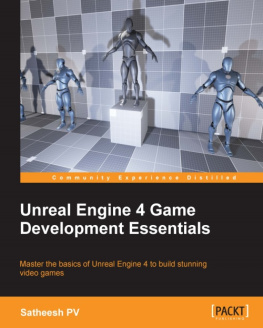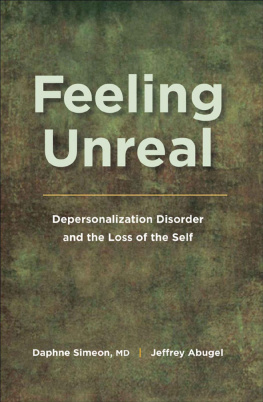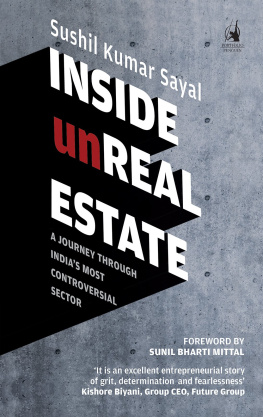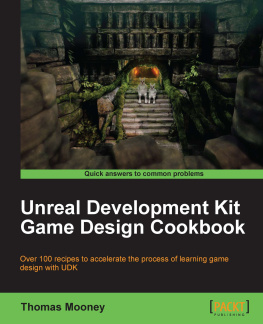Herscher - The Unreal Estate Guide to Detroit
Here you can read online Herscher - The Unreal Estate Guide to Detroit full text of the book (entire story) in english for free. Download pdf and epub, get meaning, cover and reviews about this ebook. year: 2018, publisher: The University of Michigan Press, genre: Politics. Description of the work, (preface) as well as reviews are available. Best literature library LitArk.com created for fans of good reading and offers a wide selection of genres:
Romance novel
Science fiction
Adventure
Detective
Science
History
Home and family
Prose
Art
Politics
Computer
Non-fiction
Religion
Business
Children
Humor
Choose a favorite category and find really read worthwhile books. Enjoy immersion in the world of imagination, feel the emotions of the characters or learn something new for yourself, make an fascinating discovery.
The Unreal Estate Guide to Detroit: summary, description and annotation
We offer to read an annotation, description, summary or preface (depends on what the author of the book "The Unreal Estate Guide to Detroit" wrote himself). If you haven't found the necessary information about the book — write in the comments, we will try to find it.
The Unreal Estate Guide to Detroit — read online for free the complete book (whole text) full work
Below is the text of the book, divided by pages. System saving the place of the last page read, allows you to conveniently read the book "The Unreal Estate Guide to Detroit" online for free, without having to search again every time where you left off. Put a bookmark, and you can go to the page where you finished reading at any time.
Font size:
Interval:
Bookmark:
 Page i Page ii
Page i Page ii DIGITALCULTUREBOOKS, an imprint of the University of Michigan Press, is dedicated to publishing work in new media studies and the emerging field of digital humanities.
Page iiiAndrew Herscher
The University of Michigan Press
Ann Arbor
Copyright by Andrew Herscher 2012
Some rights reserved

This work is licensed under the Creative Commons Attribution-Noncommercial-No Derivative Works 3.0 United States License. To view a copy of this license, visit http://creativecommons.org/licenses/by-nc-nd/3.0/ or send a letter to Creative Commons, 171 Second Street, Suite 300, San Francisco, California, 94105, USA.
Published in the United States of America by
The University of Michigan Press
Manufactured in the United States of America Printed on acid-free paper
Printed on acid-free paper
2015 2014 2013 2012 4 3 2 1
A CIP catalog record for this book is available from the British Library.
ISBN 978-0-472-03521-2 (pbk. : alk. paper)
ISBN 978-0-472-02917-4 (e-book)
Precisely because physical devastation on such a huge scale boggles the mind, it also frees the imaginationto perceive reality anew; to see vacant lots not as eyesores but as empty spaces inviting the viewer to fill them in with other forms, other structures that presage a new kind of city which will embody and nurture new life-affirming values in sharp contrast to the values of materialism, individualism and competition that have brought us to this denouement.
Grace Lee Boggs, The Next American Revolution
The world of capitalist culture, economy, politics, and consciousnessis full of an incredible variety of imagined schemes (political, economic, institutional), many of which get constructedIf such fictitious and imaginary elements surround us at every turn, then the possibility also exists of growing imaginary alternatives in its midst.
David Harvey, Spaces of Hope
The waste of the system, that which refuses proper integration: these are the remains of a commons defeated, and the anticipatory omens of a commons to come.
Rob Halpern, Provisional Prepositions for a Project on the Commons
- Page vii
- Page viii
The Detroit Unreal Estate Agency was founded in 2008 as an open-access platform for research on urban crisis, using Detroit as a focal point. Against the apprehension of Detroit as a problem that needs to be solved, the Agency has regarded Detroit as a site where new ways of imagining, inhabiting and constructing the contemporary city are being invented, tested and advanced.
In its research, the Agency has produced an array of concepts to describe and analyze Detroit; tendentiously recovered a series of accidents, false starts and prematurely abandoned projects; and sublimated urgent expressions of longing. This work has been unified by an interest in animating valueless or abandoned urban property by new cultural, political and social desires. Sometimes this interest has yielded experiments such as the nighttime illumination of vacant lots by hijacked electricity; sometimes it has yielded the collaborative mapping of territorial incongruities with licit and illicit community groups; sometimes it has yielded the production and distribution of manifestos, atlases, postcards and other urban texts; and sometimes it has yielded the recruitment of art and architecture students for unreal estate agency via the teaching of studios in institutions of higher learning.
The Agency's program of feral research is an outcome of its engagement with unreal estate; the Agency thereby exists as one of this guide's subjects. At the same time, however, my own unreal estate agency emerged amid the Agency's collective work. The Agency, then, is both within and beyond this guide, at once a context for the guide and a text included in it.
Page 3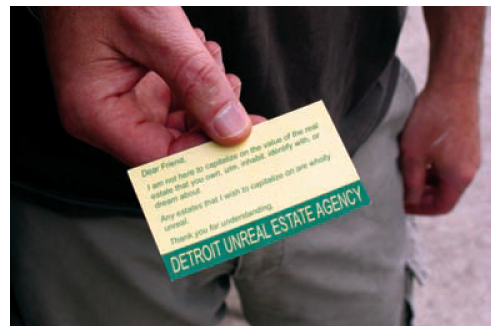 Page 4
Page 4 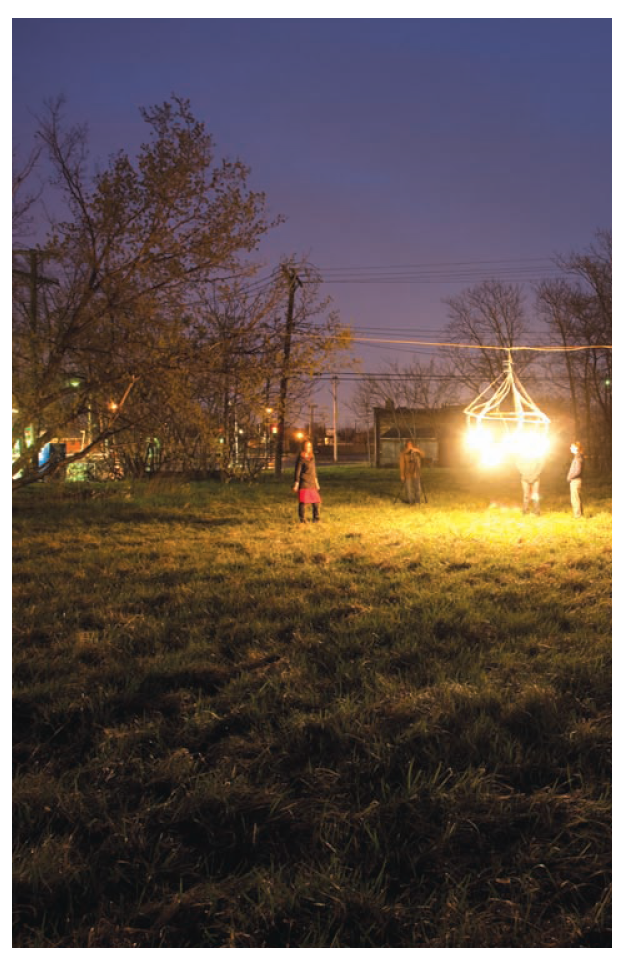 Page 5
Page 5 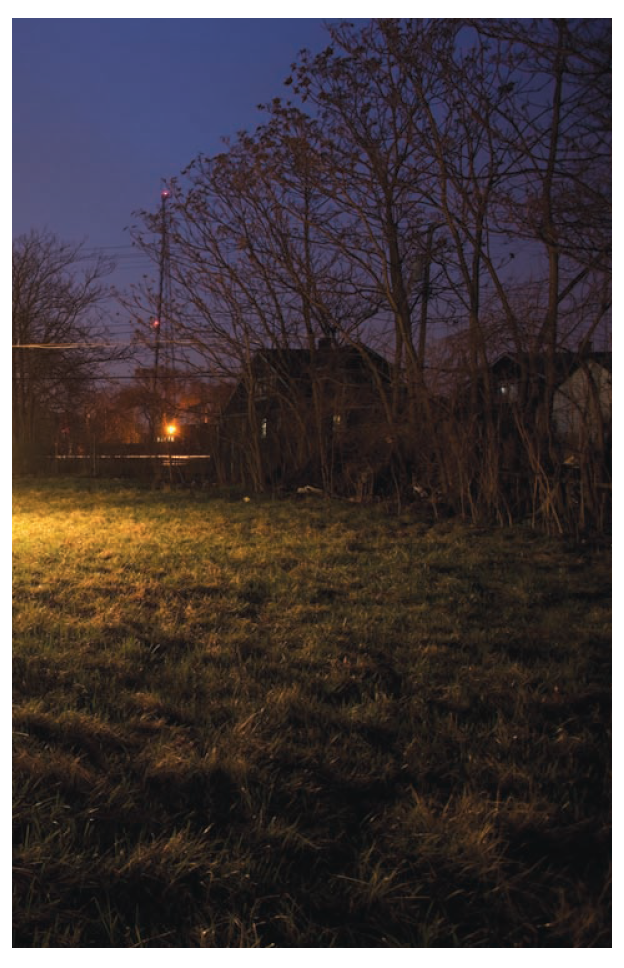 Page 6
Page 6 unreal (n-r'al, -rl)
adjective
- not corresponding to acknowledged facts or criteria;
- being or seeming fanciful or imaginary;
- lacking material form or substance;
- contrived by art rather than nature;
- Slang: so remarkable as to elicit disbelief.
Detroit: a city seemingly so deep in decline that, to some, it is scarcely recognizable as a city at all.
And so, to most observers, and more than a few residents, what's there in Detroit is what's no longer there. Theirs is a city characterized by loss: of population, property values, jobs, infrastructure, investment, security, urbanity itself. What results is vacancy, absence, emptiness, catastrophe and ruin. These are conditions of the shrinking city, a city that by now seem so apparent in Detroit as to prompt not verification but measurement, not questions but responses, not doubts but solutions.
Built into the framing of Detroit as a shrinking city, though, are a host of problematic assumptions about what a city is and should be. On the basis of these assumptions, change is understood as loss, difference is understood as decline, and the unprecedented is understood as the undesirable. These understandings presume the city as a site of development and progress, a site defined by the capitalist economy that drives and profits from urban growth. The contraction of such a site, therefore, provokes corrective urbanisms that are designed to fix, solve or improve a city in decline.
What corrective responses to shrinkage reciprocally pre-empt, however, are the possibilities and potentials that decline bringsthe ways in which the shrinking city is also an incredible city, saturated Page 7 with urban opportunities that are precluded or even unthinkable in cities that function according to plan. Taking advantage of these opportunities requires an approach to the shrinking city not so much as a problem to solve than as a prompt to new understandings of the city's spatial and cultural possibilities.
Especially in the United States, architecture and urbanism almost always have learned their lessons from cities where the capitalist economy is flourishing, from interwar New York (Delirious New York), through postwar Las Vegas (Learning from Las Vegas), to late 20th century Houston (After the City) and beyond.
But the shrinking city can teach not only professionals; it also can and does teach its own inhabitantswith inhabitation here posed as a political act rather than a geographically based condition. It has also yielded the race-and Page 8 class-inflected portrayal of members of the creative class as the fundamental harbinger of change in Detroit, a portrayal that has played out in media exposure, access to grants, and a host of other forms, as well.
Socio-economic marginality, however, should be understood not as a call for creative others but as a condition of possibility for the emergence of creativity itself. In this sense, marginality allows for the formulation of new and innovative ways to imagine and inhabit the city. This is not to suggest that the mantle of heroism be transferred from a creative class to an underclass; it is, rather, to recognize the unique capacity of Detroit's inhabitants and communities to understand and transform their city. Indeed, for many in Detroit, hope for the city's problems to be solved by others has not been relinquished so much as ignored as in utter contradiction to the city as both history and lived experience. In Detroit, that is, urban crisis not only solicits skills of endurance, but also yields conditions favorable for invention and experimentfor the imagination of an urban realm that parallels the realm of concern to urban professionals and experts.
Next pageFont size:
Interval:
Bookmark:
Similar books «The Unreal Estate Guide to Detroit»
Look at similar books to The Unreal Estate Guide to Detroit. We have selected literature similar in name and meaning in the hope of providing readers with more options to find new, interesting, not yet read works.
Discussion, reviews of the book The Unreal Estate Guide to Detroit and just readers' own opinions. Leave your comments, write what you think about the work, its meaning or the main characters. Specify what exactly you liked and what you didn't like, and why you think so.

